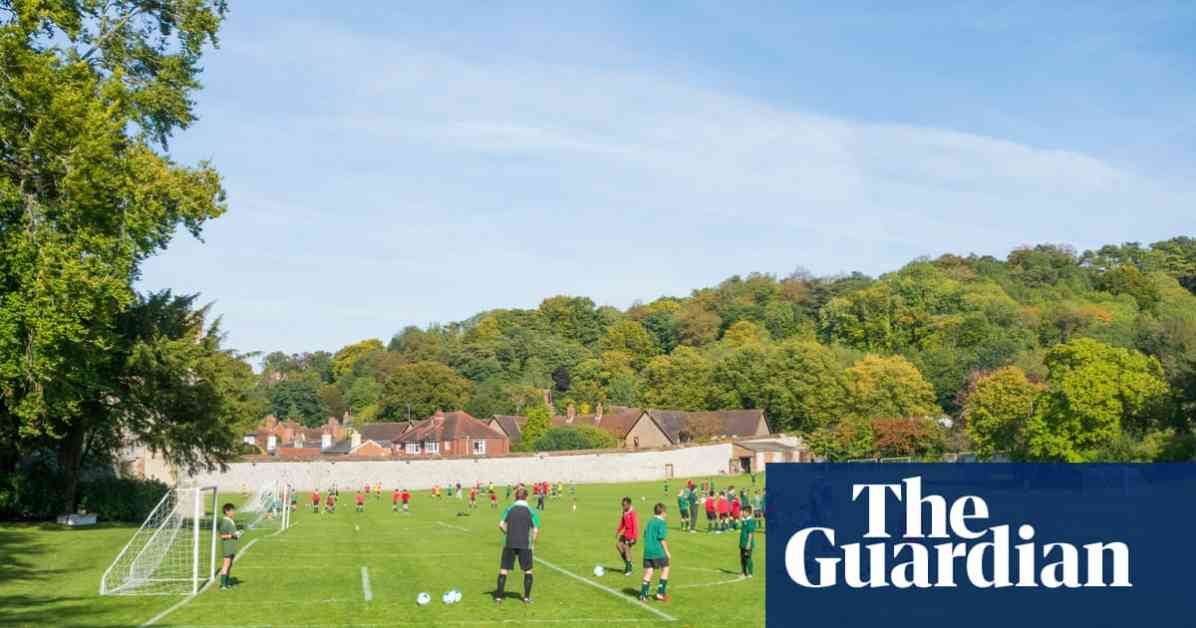Children in the UK are in urgent need of more accessible green spaces, according to Kieran Connolly, the founder of Sports Fun 4 All. This sports charity offers free football sessions to children in south London and is now advocating for private schools to open up their grounds for the benefit of all children. Connolly believes that every child, regardless of their school background, should have equal opportunities to play and enjoy outdoor activities.
Connolly’s passion for providing accessible green spaces stems from his own experiences growing up in south-east London. He reminisces about the Catford Pitz pitches, a place where he and many other young people found solace and camaraderie through sports. The open gates and free access to play allowed for endless hours of fun and social interaction. However, in 2011, the pitches were bought by St Dunstan’s College, an independent school that initially reserved the fields for its students’ exclusive use.
Through Connolly’s persistence and collaboration with local councillors, St Dunstan’s eventually agreed to open up their floodlit pitches once a week for Sports Fun 4 All to host football sessions for young people in Catford. This partnership has not only provided a space for children to engage in physical activity but has also fostered relationships with the local community and other organizations like Chelsea FC. The school’s involvement in hosting tournaments and supporting initiatives like the Lewisham Young Leaders Academy demonstrates a commitment to promoting social mobility and wellbeing in the area.
The stark difference in access to green spaces between private and state schools has been highlighted by recent investigations, revealing that private school students have ten times more green space available to them than their state school counterparts. This inequality underscores the importance of initiatives like Sports Fun 4 All in bridging the gap and providing equal opportunities for all children to enjoy the benefits of outdoor recreation.
Subheadings:
Challenges Faced by Children in Accessing Green Spaces
The Impact of Green Spaces on Child Development
Addressing Inequality in Green Space Access
Challenges Faced by Children in Accessing Green Spaces
In urban areas like Catford, where green spaces are limited, children face significant challenges in accessing outdoor recreational areas. The closure of public spaces or their conversion into private property further exacerbates this issue, leaving many children with limited options for outdoor play. This lack of access not only impacts their physical health but also hinders their social and emotional development.
The Impact of Green Spaces on Child Development
Research has shown that green spaces play a crucial role in promoting child development and overall wellbeing. Access to nature has been linked to improved mental health, reduced stress levels, and enhanced cognitive function in children. Outdoor activities also encourage physical fitness, creativity, and social skills, all of which are essential for holistic development. By providing easy access to green spaces, communities can nurture healthy and resilient children who thrive in various aspects of their lives.
Addressing Inequality in Green Space Access
The disparity in green space access between private and state schools highlights the broader issue of inequality in society. While private school students enjoy ample opportunities for outdoor recreation, state school pupils often lack access to basic facilities like playgrounds and playing fields. This inequity not only perpetuates social divides but also deprives disadvantaged children of essential experiences that contribute to their growth and happiness. Initiatives like Sports Fun 4 All and partnerships with schools like St Dunstan’s College are crucial steps towards addressing this imbalance and creating a more inclusive environment for all children.
In conclusion, the call for private schools to open up their grounds for children’s access to green spaces is not just about providing a place to play; it is about creating a level playing field where all children have equal opportunities to thrive and succeed. By investing in accessible green spaces and prioritizing the well-being of our youth, we can build healthier, happier communities that support the growth and development of every child.

